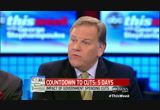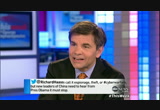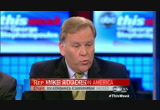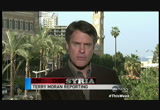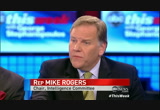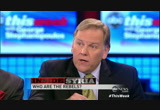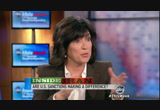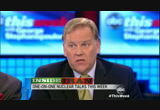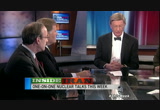tv This Week With George Stephanopoulos ABC February 24, 2013 8:00am-9:00am PST
8:00 am
of the world. just this week, the pentagon announced that, if these cuts go through, almost 800,000 defense employees, the equivalent of every person in miami and cleveland combined, will be forced to take an unpaid leave. >> and with that, let's take the debate to our first roundtable. headlined be i the chairman of the house intelligence committee, mike rogers of michigan. lead democrat on the house foreign affairs committee eric engel and our own george will and christiane amanpour. >> the impact on the national security, there is no doubt. there's some misnomers. only 2 cents on the dollar over the whole federal budget. that's in seven months and highlighted, put at least most of the burden on the defense department. that's going to have an impact. that's a 13% cut. the best way to get through this, i mean, we can point fingers. the best way to do this is to allow flexibility. if you allow flexibility --
8:01 am
you don't have to shut down -- >> i wanted to bring that to congressman engel. >> i think the sequester was a stupid thing. i voted against it when it first time it came up. it's really a ridiculous thing to do. the fact is, we need to do things that are smart, not take a meat cleaver and just cut. >> should the white house accept this call from the republicans in congress where to hit with the cuts? >> i think congress should sit down and avoid the sequester and if the sequester kicks in, for a week or go, we should then fix it. >> the navy insists they really had no choice than to delay the deployment of the aircraft carrier. if so, if they have no wiggle room at all, that suggests to me that flexibility is what the administration does not want them to have. because they want to maximize the pain. they want disruptions in air
8:02 am
travel and all of the rest, to push pressure on republican to unravel the sequester. >> congressman rogers, right now, at least, within a month, you're going to have these furloughs on the civilian employees. >> if we have flexibility, there's a big difference between a sailor on the eisenhower out in the medittarean and the travel coordinator at the epa. you can't treat them the same and the way this is structured it treats everyone the same. you can't do that. if you give them the flexibility, they can make that determination. we have intelligence operations that could get slowed down or stopped. that's a problem. but if you sit down and talk to these folks and say, if you had the flexibility, can you find 2 cents on the dollar on efficiencies other than cutting the bones? >> george, it's here we go
8:03 am
again. government by crisis. lurching from left to right. the military in the united states is in play. it's not just the aircraft carrier and intelligence and the navy, it is also flight hours. they're having to cut down what the air force personnel can do. what pilots can do. and even deployments for troops overseas, unable to sort of, perhaps transfer and transfer personnel out there. people would have to have longer deployments. the whole thing doesn't make sense when viewed from outside. but now, another big headline, from this week, we saw a report coming out, detailing chinese attacks, chinese military cyberattacks on u.s. targets, 140 targets. look at this is from the "new york times." its focus is on companies involved in the critical infrastructure of the united states. according to security researchers one target was a company with remote access to more than 60% of oil and gas
8:04 am
pipelines in north america. serious threat over several years. it drew the attention of the former head of the cia. >> my father said quit whining, defend yourself after i had gotten into a fight. there are a lots of way we can make this relation less comfortable to them. if this is important, then you got to start taking some actions. >> congressman rogers, you say that this is a war we're losing? >> we are losing. 141 targets pales in comparison. that's probably every day. we get every single day by a series of attacks. everything from criminals trying to get into your bank account to steal your identity to nations. >> you believe that chinese -- the chinese government, the chinese military is behind this? >> beyond a shadow of a doubt. they use their military to steal intellectual property from
8:05 am
american businesses and european businesses, repurpose it, and compete in the international market against the united states. it's unprecedented. this has never happened in the history of the world, where one nation steals the intellectual property to repurpose to illegally compete against the country. and i'll tell you, it's bad as i have ever seen it. it's getting worse, why, there's no consequence for it. >> the "new york times" report that quoted this troop, traced this latest outbreak of cyber war fair to building this shanghai. they traced it to the street. that's a building, a unit owned by the pla. >> companies have been unwilling to talk about this. that is changing now? >> it is. they're dealing with a very difficult, frankly a gangster regime in china right now. nobody wants to make them
8:06 am
unhappy. george, last june, david sanger in the "new york times" ran a story from his first months in office, president obama secretly ordered sophisticated attacks of computer attacks that ran iran's nuclear enrichment facilities. we have participated in cyber sabotage. >> that's what the chinese are saying. >> and it turns out, what if china is thinking, we can compete with the united states or maybe we can just learn how to disable the massive infrastructure of our potential ally or adversary? >> this is an important difference. the united states does not participate, use its military intelligence services for economic espionage, we do not do that. it's prohibited. now, we -- to say as the chair of the intelligence mitt tee, it would be crazy to say that we don't participate in espionage.
8:07 am
it's a long-standing tradition between nations. but this is very, very different. >> i think this gets to a fundamental relationship with the chinese. i think we have to make it very clear to them, that this cannot be business as usual. if they're going to continue to do this, there's a price to pay. i was just in beijing with the chairman of the foreign affairs committee. we raised this with the chinese -- top chinese officials, they let it roll off their back. they don't admit to it. >> is the white house pressuring hard enough? >> well, i think they can do it more. i think they're doing it hard enough. i think they're making it clear. but i think there has to be a fundamental stand that we need to take with the chinese. it can't be business as usual. >> so, what is the way to fight back? sanctions? what? >> i argue you need to start indicting bad actors. you need to start impacting individuals' abilities who are participating in this activity in china.
8:08 am
to get visas, their families to get visas. it needs to be a direct bilateral discussion. put one, two, and three. it's that serious. we have a well-known company who was hacked, had their blueprint stolen, if you will, estimates 125,000 manufacturing jobs lost. >> it could be cyber pearl harbor. >> but again, there's an intellectual blank slate right now on which the international committee meets to write rules. and laws. david sanger last june, it appears to be the first time that the united states has repeatedly used cyber weapons to cripple another country's infrastructure. i take your point, it's different. >> you can't believe everything you read in the press, george. >> are you saying that he's not? >> i would be very cautious about ascribing authorship. to that particular event.
8:09 am
>> would there be anything wrong if united states was trying to sabotage the iran's nuclear program? >> those kind of things happen. here's the difference, if someone comes into your office and steals your sensitive intellectual property and walks out the door with it, that's a crime. what difference does it make if it do it in person or i do it through my computer? there shouldn't be any difference. i'm arguing let's start the indictment process to send a message to china that you cannot -- if you want to be an international player, you can't act like a thief in the night. >> one more question on this, you're talking about economic espionage. how serious in the future is the threat? >> huge. here's the scary part of this, it's already part of military planning for the russians. for the chinese. and here's where it gets interesting. now, the iranians. there's a company in saudi
8:10 am
arabia, a very sophisticated attack, it basically killed 30,000 machines, meaning you're not going to reboot that computer of yours. it manipulated data, changed data. and destroyed data. very, very serious to the functioning of that company. now, here in the united states, it's been ascribed to the iranians that they were probing our financial institutions. it's called a denial of service attack. it's very low on the sophistication scale. they're probing, looking for vulnerabilities. they're already looking to disrupt. china would be a rational actor. wouldn't pay for them to use a military-style attack. same with the russians. >> the regimes of deterrents here. deterred with nuclear forces -- >> you can. if you're going to punch your neighbor in the nose, best to hit the weight room for a couple of months. >> we're not ready yet? >> we're not ready.
8:11 am
we're completely vulnerable. another subject. syria, the situation seemed to have deteriorated. we talked to terry moran earlier this morning about the options the u.s. has right now. >> george, we just got out of syria. and the first thing to say is, it looks like the situation there is going to go from worse to worst. you got rising sectarian hatred. now, staking their claim to the future in syria, massive war crimes, rising violence and criminality, and we could find no evidence that bashar assad or his army is about to break. quite the contrary. they wanted to change the government. now given the chaos, they don't. the united states has a choice, armed the rebels, engage deeply in a dangerous war for this region or broker a peace,
8:12 am
probably with russia. give the syrian people an opportunity to determine their future and at least in the first stages, assad's likely to be a part of that process. >> congressman engel, is that the choice? >> i think it is. i think it's time to armed the rebels. i think the free syria army needs help. we know who they are. it's time that we make that move. >> i spoke to white house officials about this. they make two arguments against arming the rebels. one, you don't want them to have shoulder-fire missiles because of the threat to aircraft. number two, the opposition is getting what it needs right now from the gulf states. >> well, shoulder-fired weapons, i'm not talking about that. i certainly think there are other things that we can use to get to them. it's never the right time. always a time that could be better. i think we run the risk of seeing assad hang on for a long time.
8:13 am
he's a bad player. back in 1979, when his father was in power, countries that aid and abet terrorism, syria was a chartered member of that list. in 2004, i wrote a accountability act on syria, with sanctions on syria. nothing has changed in syria. this has been a regime that governs with an iron fist. they murdered tens of thousands of their own people. there's almost 1 million displaced. it has the potential to disrupt other countries like jordan, all around, and i think it's time that the united states takes a fair stand by arming the rebels. >> you agree? >> the best that we can hope for now is the best of the worst outcome. the united states doesn't have credibility with the opposition now. so, any diplomatic-negotiated settlement here, the united states can't play an important role, because they don't have the faith and confidence of the opposition. clearly, russia is playing a game here that could be helpful. here's what i think we should
8:14 am
do, i think we need the jordanians, the turks are all putting weapons systems in to syria to aid the opposition. the islamists have attached themselves to most of the secular units. almost every unit, now, has islamist as some of their main fighters. they need them and count on them for the fight. that's a huge problem for the united states. we have all of those weapons systems, including conventional weapons, that will awash the lemont across the middle east. we need to take a leadership in this. with all of the arab league. i would have a no-fly zone in the north. safe zone in the north. and coordinate all of the weapons systems that are going in so that at least we have the credibility for negotiated settlement. >> congressman, talking about credibility, secretary kerry is going over this week to
8:15 am
middle east. >> that's true. in rome, where the opposition is boycotting because of what they say is, an unacceptable response from the u.s. to syria. so much is complicated. this has been two years now. and all of the reasons for not intervening have actually come true for not intervening. all of the things that you just outlined. friends around the united states, destabilize the massive amount of weapons that could be loose. happening in libya, africa, with al qaeda popping up. beyond that, do we want to see syria become somalia? do we not remember what somalia was for the united states? and that whole region. the options as far as i can see is the u.s. does what you're
8:16 am
suggesting. tries to have skin in the game. tries to have some credibility on the ground, some influence on the ground. turns a war into a shorter war rather than a longer war in somalia. >> well, let me try to disrupt the harmony. we have two objections. objectives. the humanitarian objective of economizing violence. and the strategic objective of controlling the outcome. no analogy is perfect. going back to the spanish civil war that began in 1936, by the time it got in full-blown proportions, there was no happy choice. we're going to be the communist and we're going to control spain or we're going to be franco and going to control spain. you say congressman, we know who the rebels are. how do we know? >> we know, we know the free army.
8:17 am
let me say one thing, it's a blow to iran if assad falls. assad has been the ally of iran and hezbollah, terrorist organization, by the way, the europeans should designate hezbollah as a terrorist organization. iran would be dealt a blow. they're fighting. they have their shoulders in syria. hezbollah is fighting in syria. this would be a strategic vote to iran. if assad falls. >> our david muir spent a week in iran, in tehran, around the country, took a look at how hard these international sanctions are hitting. >> george, good morning. there's really no question that the economic sanctions, the tightening sanctions led by the u.s. are truly felt here in iran. so many people talked about the prices going up dramatically here. inflation at rates 40% in some places. there's no question that people are feeling these sanctions. the question is whether or not the leadership is feeling it and
8:18 am
whether they're going to do anything about it? all of that alluding to the economic sanctions. people here feeling it. whether or not that's going to press leaders next week is the big question this morning, george. >> that's the question, christiane. the president ahmadinejad conceded that it's been a very difficult year. >> yeah, it's been catastrophic. just talking to people in iran it's been catastrophic for the people. it's less affected the regime and what it has done is militarized iran. in other words, now, everything is view in the parameter of war. the revolutionary guard in iran is now taking on another excuse for taking over the press. i think what's interesting is, there was a very interesting conversation with the iranian
8:19 am
ambassador here, who said that we can have talks, we don't want to with a gun to our heads. we don't have red lines. except that the united states has to accept our rights under the nuclear nonproliferation treaty. the question is, will the congress, will the political fear here in the united states, allow real diplomacy? have a real diplomatic negotiation. >> congressman, the fear that these talks are just a stalling tactic? >> well, the most productive thing that we have gotten with talks is an agreement with more talks. that stalling, that time has cost us in their development of their nuclear weapons program. they just recently put in more sophisticated centrifuges. to spin up highly enriched uranium.
8:20 am
>> at the same time, they agreed to limit that. >> here's the problem, think about the consequence of a nuclear iran, this isn't france, this isn't great britain, this isn't rational actors. these folks have committed acts of terror. they killed 600 u.s. soldiers in iraq and afghanistan by introducing weapons systems and training. bulgaria is now going to the eu to try to get at least some tougher sanctions on hezbollah through iran because of their attempt -- they attempted to kill the saudi ambassador in washingt washington, d.c. >> if the president means what he has said repeatedly and clearly, nuclear iran means war with the united states. the president has said that he does not endorse containment of iran. they will not have, he said, nuclear weapons. if they cross that threshold, there must be some red line
8:21 am
somewhere that means war with iran. >> i mean, there are other options to war. >> i think the worst possible scenario would be a nuclear-armed iran, i think that has to be stopped. by any and all measures. >> which the president has pledged to do. >> which he has. i think we need to work in consultation with our european allies to make sure that that doesn't happen. they have been bad players straight-on. they're not negotiating in my opinion in good faith. i think we have to understand that. >> the real question is, what to do? we can talk about this until we're blue in the face. which we have done for decades now. the most painful sanctions imposed on iran are under way right now. as you can see, they're not affecting their desire to continue to enrich. the question is, what does one do? you say irrational. this is not an argument, it's
8:22 am
really -- >> in terms of military conflict with the united states, that isn't being rational, that's being sane. they have committed act of terrorism around the world is not rational. the fact they're trying to get after our financial institutions through cyber attacks. >> the real issue is what does one do? we have to move on. very quick question, yes or no, will there be a military conflict with iran this year or do you believe there's another way to block their program? >> i think there's other ways to block their program. >> congressman, thank you. christiane, you'll stick around for our web extra. coming up, george will joins the new roundtable and plus the man behind the time cover story. plus, we have the man behind the cover story on "time" magazine.
8:23 am
>> i don't think i have ever said this before. go out and get "time" magazine. executor of efficiency. you can spot an amateur from a mile away... while going shoeless and metal-free in seconds. and you...rent from national. because only national lets you choose any car in the aisle...and go. you can even take a full-size or above, and still pay the mid-size price. now this...will work. [ male announcer ] just like you, business pro. just like you. go national. go like a pro.
8:24 am
just like you. and every day since, two years ago, the people of bp made a commitment to the gulf. we've worked hard to keep it. bp has paid over twenty-three billion dollars to help people and businesses who were affected, and to cover cleanup costs. today, the beaches and gulf are open for everyone to enjoy -- and many areas are reporting their best tourism seasons in years. we've shared what we've learned with governments and across the industry so we can all produce energy more safely. i want you to know, there's another commitment bp takes just as seriously: our commitment to america. bp supports nearly two-hundred-fifty thousand jobs is we're working to fuel america for generations to come. today, our commitment to the gulf, and to america,
8:25 am
has never been stronger. next roundtable is ready to go, but first, the "sunday funnies." the u.s. postal service is launching a clothing line. they're going to sell post office clothes. which makes sense, because every time i walk into the post office, i'm like it's like a european fashion show in here. where can i get some of that stuff? a new report shows that chinese hackers can one day take out the power supply, or that's also known as pulling a beyonce. or otherwise known as pulling a beyonce. [ kitt ] you know what's impressive? a talking car. but i'll tell you what impresses me. a talking train. this ge locomotive can tell you exactly where it is, what it's carrying, while using less fuel. delivering whatever the world needs, when it needs it.
8:26 am
♪ after all, what's the point of talking if you don't have something important to say? ♪ if you don't have something important to say? i've always had to keep my eye on her... but, i didn't always watch out for myself. with so much noise about health care... i tuned it all out. with unitedhealthcare, i get information that matters... my individual health profile. not random statistics. they even reward me for addressing my health risks. so i'm doing fine... but she's still going to give me a heart attack. we're more than 78,000 people looking out for more than 70 million americans. that's health in numbers. unitedhealthcare.
8:27 am
otherworldly things. but there are some things i've never seen before. this ge jet engine can understand 5,000 data samples per second. which is good for business. because planes use less fuel, spend less time on the ground and more time in the air. suddenly, faraway places don't seem so...far away. ♪
8:28 am
tarnish with a battle in the house. it's a rat's nest in there. they rejected the amendment ten months ago, they'll lose. >> i like our chances now. 007 over here into a country that wants cia blood on their breakfast cereal. and you're going to walk the brady bunch out of the most-watched city in the world. >> that's right. >> we did suicide missions in the army that had better odds than this. >> 100% he's there. okay, fine, 95%. because i know certainty freaks
8:29 am
you guys out. but it's 100. >> lot of politics up for best picture this year. we'll talk about that in a little bit. here with our second roundtable. joined by george will again. abc news contributor donna brazile. steven brill. author of a new "time" cover story. "why medical bills are killing us" is the title. steven rattner. and kimberley strassel. i want to start talking about this sequester, it is hitting on friday. the public doesn't seem to mind all that much. a pew poll out this week, about 49% of the public say they want to delay the cuts. but 40% say let them go in effect. most of the blame seems to be heading towards the gop. 49% say they should bare the blame for this. only 30% for president obama. kim, you argued in the wall street journal this week, republicans are in a strong
8:30 am
political position, you say that the sequester isn't some gop fallback position, it's a proactive strategy. their way of changing the washington spending debate. they aren't bluffing. >> this is where they wanted the debate to be, on government spending. you go back two months ago, the focus was on the lack of unity in the party. now, they have brought this back to the issue they think matters, which is size of government, whether or not we're spending too much, what the drag of federal spending is on the private economy, and increasingly, they're bringing it back to this one central question, which is the only question in this debate, which is to the white house, are you honestly saying that you can't cut $85 billion out of a $3.8 trillion budget? >> it was meant to force a compromise. a balanced way of spending cuts as well as revenues. it wasn't intended to shut down a government or to have one side win an argument when both sides agreed that we need to have a
8:31 am
more robust economic growth and a plan to solve this problem, not just in the short term but in the long term as well. >> $85 billion number itself is the wrong number. that's budget authority. the cbo, congressional budget office, said actual spending cut would be $44 billion in this fiscal year. that's less congress shoveled out the door to help the victims of superstorm sandy. >> but, george, it's on top of a $1.5 trillion. >> well, we're being told by the president that these are severe, brutal, meat-cleaver, those are all his words. approaches. 2.4 spending. one-half percent gdp. the domestic agencies that would receive on average a 5% cut, received from mr. obama in the
8:32 am
last five years, 17% increases. so, the president's position has to be, the logic of it is, right now the government is the minimal government that spends between us misery and chaos. >> that's not the president's position. let's start with facts. it's not a 2%. these cuts are focused heavily on what we call domestic discretionary spending. education and traffic. things that matter. these are 5% cut. as george said, on top $1.7 trillion of cuts voted in the last two years, all on these same programs. i don't think the president is opposed to talking about spending. i'm certainly not opposed about talking it. let's put everything on the table, including entitlements and including revenues. revenues were increased a small amount relatively to amount of spending cuts.
8:33 am
it needs to be a balanced approach. >> but it doesn't have to be that way. this is up to the white house. >> it's not up to the white house. >> you can fix it tomorrow. just move the $85 billion. are you saying that subsidies to companies, slush funds, duplicated programs? there are plenty of ways to move that money into something that makes sense. >> absolutely. the president has proposal to where to move it to. republicans aren't interested. >> tax hikes. >> not just tax hikes. he has spending cuts in it. he's prepared to do that. the republicans would rather say, sequester is the president's idea. we're not going to allow anything to happen to it. because we want it to go into effect so everybody will see that it's the president's idea. >> what i don't understand about this is, everybody says it's a terrible idea. an awful idea. yet, everybody voted for it. and the white house keeps
8:34 am
repeating that they want a balanced approach. the president has all of these cuts in mind, including cuts to entitlements. but i haven't seen anything specific that he's proposed. >> at least two specific entitlement cuts on the table. the consumer price index on social security. proposed limiting that. raising the age for medicare eligibility. >> the president has come up with three different plans. at various times post the sequester to try to force the republicans to come back to the table to bring revenues into the table. >> when did he put out a statement, let's raise the medicare age to "x"? i haven't heard that. >> couple of things. >> the president has talked about raising the medicare age. >> to what? >> to 67. in fairness, he backed off that a little bit. the fact is, the president has a plan. this is his plan. $1.4 trillion cuts.
8:35 am
balanced between revenues and spending. he's ready to have a dialogue. the republicans, you're saying that you like the sequester. it's fine. that's your position. let's let it happen. >> i want to go back to what you said, mr. rattner, $85 million out of $1.6 trillion economy. at the end of the world war ii, cut federal spending 40% in one year. and what resulted was what we called was a postwar boom. >> i didn't say it was going to knock the economy sideways. i said it was going to have an effect on the economy. it might sound like a lot. fragile economy. but there are specific programs that are going to be affected. what every unemployed person gets will be reduced. there are going to be fewer
8:36 am
agriculture inspectors to stand in food processing plants. which means, those plants can't process foods. >> one of the things that i think the democrats are counting on, some time in april and may, when this all starts to kick in, the republicans are going to break again. >> they're not going to, because they have put this central to their strategy, they chose to do this. they want to have this debate. again, it's not a fallback. i think there a are a couple of dangers here for the white house. they are warning of doom and gloom. how bad is it actually going to be when it happens? that's a big question. that hasn't been answered. lot of people aren't paying attention. how many americans -- this isn't a government shutdown. people are still going to get their passports, visit national parks. how many americans are paying attention? and how many are going to decide this is the armageddon of. president -- >> it's the government slowdown. a shutdown might occur in march 27th, when the continued resolution runs out. but this will have a real impact
8:37 am
on the regional economies all across the country, whether it's the threat of furloughs to federal employees. george, we have to brace for it in the washington region. but the truth is that, it's going to have an impact on children in head starts. schoolteachers, first responders, firefighters. people who live in subsidized housing will see their checks drop. >> and, george, the economy doing fairly well right now, was on track for about 3% growth. if you add the effect of the sequester, if it holds, and the tax increase at the beginning of the year, economists say that took over 1% off the economic growth. >> some economists. other economists deny that you can have a discernible effect with $34 billion. >> also, maybe it could have a positive effect. markets are worried about the
8:38 am
size of the deficit. the size of the debt. they actually want some proof that washington is making the start of fixing this program. you do this, you let this go into effect, hopefully, you do this, you send a signal to the markets that washington is making a start. >> what the american people want is a balanced approach, between spending and taxes. as we said earlier, we cut made the cuts. our spending on r and d and infrastructure has gone down by half over the last 30 years. >> the american public wants health care they can afford and health care that works for them. that gets to the subject of stephen brill's cover story. let's put up the cover right there, bitter pill, why medical bills are killing us.
8:39 am
some shocking details here, steve, you talked about sky-high medical bills. people paying $150 for an aspirin. $300 for an x-ray. that's just the beginning and right. >> that bares on the conversation we're having, because a chunk of that money is paid by medicare. medicare is like i pointed out in the article is very efficient at most things. it buys health care really efficiently, which is a great irony, because it's supposed to be the big government of bureaucracy. where it's not efficient, congress, because of lobbyists have handcuffed medicare. medicare can't negotiate what it pays for any kind of drugs. it can't negotiate what it pays for wheelchairs or diabetes testing equipment. if congress took those handcuffs off of medicare you could get about half of the spending cuts that we're sitting around here talking about.
8:40 am
>> is that true? >> you could get a fair amount. look, if medicare could get the same prices for prescription drugs that medicaid gets, it would save -- steven, i think your article was great. but i don't want people to be confused. i don't believe that we can cut our way, change the pricing and still save medicare. the average person who's at medicare retirement age has paid in some $122,000 into the system. they'll get back $387,000 in benefits. we have to fundamental medicare reforms. >> in the larger health care system, this is something that everyone at this table will think i should go to mental hospital after i say this --
8:41 am
the government and all of us would actually save money if you lowered -- i said lowered the age for medicare. if the medicare age were 60 instead of 65, the economy and the taxpayers would actually save money and, george, please don't look at me like that. >> you're potentially right. and part of the argument -- you're taking people out of the medicare system. >> right, and what you would be doing, you would be putting the most efficient player, which is medicare, medicare spends 80 to 90 cents to process a claim and the health insurance companies spend $25 to process a claim. health insurance companies pay two, three, four times what medicare pays through various services. if you lowered the age, you would put more people into the bucket of much more efficient health care. and the worst part about it is, the reforms that we have now, with the president's plan, are
8:42 am
actually going to raise the costs because all of the people who are 60, 62, 63, who can't afford the premiums that they're going to have now, are going to be subsidized by the taxpayers. >> that becomes an argument for a single-payer system. >> here's an argument against that. 12 cents is the most important number. 12 cents is the portion of every health care dollar paid by the person receiving the health care. someone else is paying the rest. it was 47 cents 50 years ago when jack kennedy was president. now, let me ask the five of you a question, you go to doctor and they say i want to give you a following test? how many of you say, how much does that cost? don't bother. the doctor can't tell you. >> george, you're completely wrong. we have tried that experiment with 30 million to 50 million americans who don't have health
8:43 am
insurance and have to pay 100% right now. and they have no choice. they are powerless consumers. if you go to an emergency room and a doctor says, you need a c.a.t. scan, you're not saying, i wonder if this is the most efficient emergency room. i wonder if i really need that c.a.t. scan. >> no, we haven't. we only have a small group of americans who are doing that. we have a much larger group of americans who are getting their health care through their companies and it's largely paid for them and they have no skin in the game. the most important part of your piece you mentioned that this is a seller's market. there's no transparency in this market. there's no competition. we spend hours deciding which toaster we're going to buy. we put no such thought or work into where we're going to get our health care. you have had companies like safeway who worked with their employees to introduce the transparency.
8:44 am
and you have seen a big reduction in health care costs. >> there's a difference between buying a toaster and buying a c.a.t. scan. >> i agree with george, that right now, most americans don't see price in health care. you see price in toasters, cars and homes. in health care, you don't see price. therefore, i have to agree, when people go on medicare, they don't see price. they tend to consume more than they otherwise would. 26 prkt of all medicare spending is the last year of life. these are really tough moral questions for the country. we'll have to deal with them. >> what you're getting to, though, is the fundamental question, are you going to let consumers make decisions about end of life decisions? >> that's a great point. if consumers you have in mind have the money because they're
8:45 am
not going to have the insurance. that's not the world we live in. they're making decisions now, those consumers who don't have insurance, because they don't have the money, they can't write the checks. they're being sued for their bills. you know, this world you describe -- >> they're in a different position. >> they're 65. >> people on either private insurance or medicare, probably consume more medical service than they need because they don't see price. >> the uninsured is not the germane cohort. the germane cohort is those with high deductible insurance. no one expects your automobile insurance to cover your windshield wipers or your oil changes. people who buy high-deductible insurance, now we have enough of them that we have real data. two things, they use the health care system less and there's no discernible health cost to it. i want to get to one more issue before we take a break.
8:46 am
the rest of the agenda has been bogged down in these budget fights, especially gun control last night, wayne lapierre of the nra coming out hard against universal background checks. >> background checks. it all sounds so reasonable. but don't you be fooled. it's aimed at registering your guns. and when another tragic opportunity presents itself, that registry will be used to confiscate your guns. >> donna brazile, it seems as this whole effort has slowed down. >> no, it hasn't. it has gone on. joe biden is the public face of it. he's out there meeting, he was in newtown last week, he's traveling all across the country meeting with law enforcement officials. patrick leahy will be putting together some proposals to try to advance this at the end of the month. gun safety laws are still topic
8:47 am
"a" across the country from tucson to colorado. maryland. state lawmakers are taking the initiative. i think mr. wayne lapierre is on the wrong side of history. >> it has slowed down. but the reason it has showed down is because the president's own party is divided on this issue. when you look in the senate, there's a lot of disagreements. among democrats themselves. the ban on semiautomatic, known as the assault rifle ban, so, there's going to be a lot of fights. but it's going to be between democrats. that has put them in an unusual spot. >> only the six democrats running for re-election. the democrats respect the second amendment rights. it's about military-style rifles. should we get them off the streets? many americans agree. >> get them off the street precisely.
8:48 am
the president went to chicago this week. chicago has more than gun homicides than new york, new york has three times the population, what's the difference? the difference is different police measures. new york, with a lot of controversy, has had stop and frisk. has had a measurable effect on violence. it's at the local level and it works. >> it did appear that there was going to be a consensus on background checks, that seems to be fraying? >> yes. you see wayne lapierre and you wonder about it. the problem here is, what history would tell us, time is not your friend on this. going back to 1968, when lyndon johnson was trying to pass gun control legislation, since jfk was assassinated, it seemed like a no-brainer, it was going to get passed, slowly, i got in the mud.
8:49 am
we're going to take a quick break. more roundtable coming up. our picks for tonight's oscars. one quick break. more roundtable coming up. our picks for tonight's oscars. . more roundtable coming up. our picks for tonight's oscars. [ male announcer ] ah... retirement. sit back, relax, pull out the paper and what? another article that says investors could lose tens of thousands of dollars in hidden fees on their 401(k)s?! seriously? seriously. you don't believe it? search it. "401(k) hidden fees." then go to e-trade and roll over your old 401(k)s to a new e-trade retirement account. we have every type of retirement account. none of them charge annual fees and all of them offer low cost investments. why? because we're not your typical wall street firm that's why. so you keep more of your money. e-trade. less for us. more for you. the world needs more energy. where's it going to come from? ♪ that's why right here, in australia, chevron is building one of the biggest natural gas projects in the world. enough power for a city the size of singapore for 50 years.
8:50 am
what's it going to do to the planet? natural gas is the cleanest conventional fuel there is. we've got to be smart about this. it's a smart way to go. ♪ big oscar show on abc tonight. who's the favorite for best picture. intrade says it's a runaway. 82% for "argo." but first, check out the first lady doing the mom dance with jimmy fallon. ♪ ♪ transit fares! as in the 37 billion transit fares we help collect each year. no? oh, right. you're thinking of the 1.6 million daily customer care interactions xerox handles.
8:51 am
or the 900 million health insurance claims we process. so, it's no surprise to you that companies depend on today's xerox for services that simplify how work gets done. which is...pretty much what we've always stood for. with xerox, you're ready for real business. [ male announcer ] when you wear dentures you may not know it, but your mouth is under attack. food particles infiltrate and bacteria proliferate. ♪
8:52 am
8:53 am
after 174 days away, who's robin's first big interview? >> there's no hotter topic than your bangs. the first lady. >> i'm embracing the bangs. >> michelle obama. robin roberts. tuesday on abc. >> that's coming up tuesday. tomorrow, we'll all be live in hollywood oscar winners. let's get some oscar predictions and preferences. so many political themes as we were talking about before. george, who's your pick for best picture and best performer?
8:54 am
>> daniel day-lewis. the best picture, i think for three reasons, "zero dark thirty." to make a suspense movie when everyone knows the outcome. it's a genuine contribution to education. but third, it's a rebuke to senator levin, feinstein and mccain who have enough to do without being movie critics. falsely accusing that movie of taking a stand on torture it does not take. >> "lincoln." a year we celebrate 150th anniversary of the emancipation proclamation. it was an emotional movie. it was a masterpiece. daniel day-lewis deserves an oscar. >> okay. >> daniel day-lewis. i find myself agreeing 100% with george, on each point he made. >> on "zero dark thirty"? >> yes. >> yes.
8:55 am
senators should be dealing with the stuff that we dealt with at the beginning of this discussion. >> you know, i got to go with george, i do agree with that "zero dark thirty." i have to go with intrade. and the fact that it's not going to win. but on the best performance, i'm actually going to get out of my comfort zone and go with anne hathaway in "les miserables." >> that was a very raw performance. >> george and steven and i can be movie buddies. i'm also going to go with "zero dark thirty." i would add to the point, it was also a great moment of american triumph. and daniel day-lewis, as well, too. it's magic to be able to embody a character like that. you really think that you're were watching lincoln. >> i have to agree daniel day-lewis. >> "zero dark thirty," to be in
8:56 am
suspense watching the movie, the whole planet knows the ending of the movie. >> i loved "argo" as well. >> same thing goes for "lincoln." you're sitting there thinking, are they going to pass the 13th amendment? >> let me give a shoutout to q wallis. i think she had an exceptional performance. she has a bright future. >> she's a darling little girl, just infectious. >> thank you. now, we'll take a break and honor our fellow americans who serve and sacrifice. after the longest gap without a casualty in afghanistan, since 2007, we learned that one service member was killed this week, the pentagon has not yet released the name. that's all for us today. thank you for sharing part of your sunday with us. check out "world news" with david muir tonight. and i'll see you on "good morning america" tomorrow, live from the oscars.
8:57 am
8:59 am
>> good morning, everyone. it is 9:00 a.m. on this oscars sunday morning. i'm katie marzullo in for carolyn tyler this morning. we will start off with a quick first look at the weather. here's meteorologist lisa argen. >> good morning, everyone. you notice the few high clouds around. the breeze is dying back but the winds are out of the north. that's the key to a warmer afternoon. as you head out this morning temperatures right around 40 degrees in the east bay and north bay.
278 Views
IN COLLECTIONS
KGO (ABC) Television Archive
Television Archive  Television Archive News Search Service
Television Archive News Search Service  The Chin Grimes TV News Archive
The Chin Grimes TV News Archive 
Uploaded by TV Archive on

 Live Music Archive
Live Music Archive Librivox Free Audio
Librivox Free Audio Metropolitan Museum
Metropolitan Museum Cleveland Museum of Art
Cleveland Museum of Art Internet Arcade
Internet Arcade Console Living Room
Console Living Room Books to Borrow
Books to Borrow Open Library
Open Library TV News
TV News Understanding 9/11
Understanding 9/11


